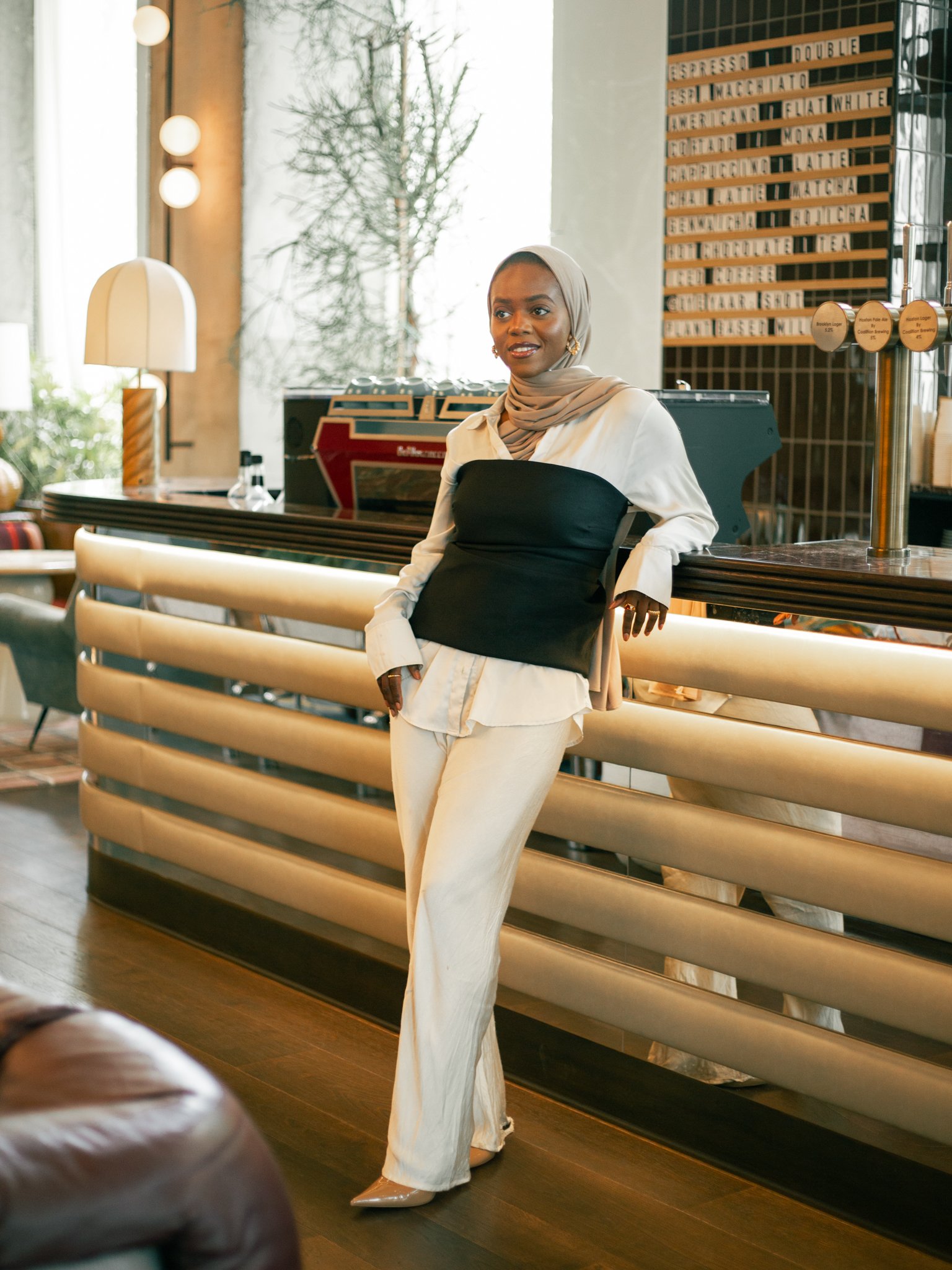
Bitisho Goga - Founder
“I curated that whole chapter before it even happened. If you make a plan, and ask Allah, you can actually live your dream.”
Inside the Mind of Bitisho: The Founder Behind The Social Vilâge
Words by The Social Vilâge Editorial Team
She walks in with presence. Not the kind that slips quietly into the background, but the kind that holds gravity. People notice. Heads turn. There's an energy shift when Bitisho enters the room, the kind that says: something's about to begin. Her story isn't one of overnight virality, but of quiet build-up, layered identity, and a vision rooted in ache, beauty, and belonging.
“I think I was around 12 when I first realized I didn’t quite belong,” she says, adjusting her hijab with grace. “We had just moved from a small Dutch village to Belgium. Until then, people treated me like Bitisho. Not 'the African girl.' Just me. But all of a sudden, I was the outsider. I had an accent. I sounded different. And it was the first time I got severely bullied.”
Born in Congo and raised in the Netherlands, Bitisho carries the rhythm of many cultures inside her. At home, the warmth of Congolese-Swahili and Muslim tradition. Outside, the Dutch way of being. And later, Belgian classrooms that echoed with differences.
“I grew up with two cultures, but also kind of... neither,”
“I grew up with two cultures, but also kind of... neither,” she reflects. “When we went to Burundi to visit family, I was the European one. In Belgium, I was too Dutch. So I became a world citizen. That was my way of surviving. Of being many things without having to pick just one.”
She lights up when asked what her childhood would be if it were a film genre. “Nickelodeon meets Disney,” she laughs. “In the early days, I was definitely the entertainer — the annoying little sister (according to my brother), always up to something, drawing, performing. But Belgium changed that. I became more observant. I started studying people, watching how rooms shifted.”
IT CAME LIKE DOWNLOAD AND THEN ONE DAY IT JUST CLICKED.
IT CAME LIKE DOWNLOAD AND THEN ONE DAY IT JUST CLICKED.
That observant streak deepened into a kind of emotional intelligence that now defines her approach to community-building. She recalls two moments that shaped her current philosophy: one painful, one golden.
“The bullying in Belgium taught me that sometimes, people just don’t like your light. You walk into a room and they’ve already decided. It taught me to know where my light is safe.”
The golden moment? Her university years. “I curated that whole chapter before it even happened,” she says with pride. “I had Pinterest boards of my uni life at 14.
The MacBook I couldn’t afford — I worked and bought it myself. I studied what I wanted, I travelled. It showed me that if you make a plan, and you ask Allah, you can actually live your dream.”
And then came the unraveling.
“I had a life-altering experience 2 years ago. One of those moments that flips everything you thought you knew. I started going to all these networking events, and they were incredible for business, for entrepreneurship. But something was missing. I needed lightness. Ease. People who get what it means to not fully belong anywhere.”
One night, she attended a workshop that posed a question: How can you use a traumatic experience to build a business? It stayed with her.
By early 2025, the idea for The Social Vilâge emerged.
“It came like a download,” she says. “Before that, I had so many ideas: apps, projects. I knew I was close. I kept telling myself: it’s loading. And then one day, it just clicked. All the puzzle pieces came together. This wasn’t just a concept. It was me.”
When asked what problem she’s really solving, she doesn’t flinch.
“It’s about community. About being known by people who understand you. It’s also about design and lifestyle, and community. There are people who can afford to live a country club lifestyle but don’t feel welcome in those spaces. I want to create a world where they do. Where we do.”
There’s something incredibly brave about that vision. Not because it’s loud, but because it changes the narrative.
“This isn’t just a brand for me,” Bitisho smiles. “It’s a homecoming.”
2025 by The Social Vilâge

